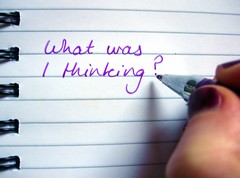Robin Blandford is doing us all a fantastic service. As he reads a book he takes the key points from them and makes them into slide shows for all of us to consume. I’m not a fan of Seth Godin, I think he’s a windbag and loves his own brilliance far too much and that many of his books can be easily compressed into a single blog post. Robin has done this for Meatball Sundae and The Dip. He’s also covered Screw it, let’s do it by Richard Branson and Blink by Malcolm Gladwell.

Photo owned by twenty_questions (cc)
There are so many books that people recommend one must read if you are into tech, into business, into startups and into politics but it’s pretty damned hard to make the time to read these books while doing everything else. (My current unread stack is about 60) I wonder would it help everyone if we took the books we just read and make slide decks like Robin does. I’m sure the copyright police would get all upset and not realise that the summaries would probably promote sales not harm them. I know I’ll make some summaries once I finish my next books. Web Analytics Demystified and The Design of Everyday Things.
Anyone else want to do Slide Deck Summaries?
Have been talking to a guy (Charlie – will point him here) about starting some sort of ‘book club’ concept. We got this far…
“You could make it subscriber-based, but every subscriber (‘the book club’) throws a number of books into the ‘to be read’ pool that they would like to read eventually. If you have a group of like-minded readers (the book club could be split into genres/themes/categories) then there is sure to be overlap. As each book is read the subscriber writes 10 slides with the main points. Other subscribers can then just use the slides as a summary to the book, or can read the book and rate the slides that other subscribers have created.”
Damien – having seen Robin’s summaries I had a similar thought to you. All these great books to read and not enough time to read them! Hence our brief exchange of emails with the ‘concept so far’.
I have actually decided to retrospectively summarise selected books that I have enjoyed in the past to create summaries for myself. Its amazing what you learn/perceive differentlty at a second ‘glance’ (and you can read it more quickly too a second time since you know the good bits!).
And as you noted, I reckon the slides will actually market the book rather than inhibit sales. I went straight out to buy the Branson book after reading Robin’s slides.
This is all great and I am in a similar situation. I have listened to most of Seth’s material via audiobook and like most of it. In fact, I smile when I hear we have implemented some of his ideas prior to hearing them. The concept of an idea virus in particular.
My book of the moment is The Art of the Start by Guy Kawaski and there is no need for slide summary for this – just watch his video presentation at http://blog.guykawasaki.com/2006/06/the_art_of_the_.html
I will keep Slide Deck Summaries in mind for my next read
The World is Flat by Thomas L. Friedman
http://www.amazon.com/World-Flat-History-Twenty-first-Century/dp/0374292884
Hi,
I think this is a great idea. I have read a good few books on startups / building companies and I still have a good long list to go. Some kind of rating system would be good, to help me prioritise what to read next. I strongly recommend “Built to Last” by Collins and Porras.
Cheers,
Cronan
I’ve been using allconsuming for general recording of books read and to be read. Definately interested in freading and putting up some summaries of books read like Kawasaki, Friedman, Blanchard and David Allen. Even some of the “old school” books like Covey.
And don’t you hate it when a blog post could just as easily be twitttered? This one could have been 100 characters long.
Of course, you can’t win them all. Many people complain my books are too short. Sigh.
Irony of the week. Seth makes point that Damien could have condensed this post to a Tweet. Damien used a Tweet to let the world know that Seth commented on the post. Somewhere in CERN they’re carefully placing this perpetual feedback loop into the Large Hadon Collider to see what happens.
@Richard LOL
Heya Seth,
Cheers for the comment, if you didn’t broadcast on Twitter and instead had a conversation there (they’re markets these days I read), then I could have Twittered it to you.
@damien
heehee
deleted all the broadcasters on twitter ages ago
It’s a great idea Mulley. My book list is probably something like yours, though I doubt you have as many “For Dummies” books as I do there…
Interesting idea, yes.
I’m wondering what kind of Cliff Notes would be produced. It would be an interesting experiment to compare and contrast two sets of Notes produced by different people to see how opinion informs their perception of important points. It would make for insightful reading. It’s very likely that ideas I note as important, are meaningless to another.
I’m not sure how consistent scabbing someone’s perception of big points from books would be. Remember how Cliff Notes scamped on the subtlety of themes? I suppose an interesting question would be – how does one achieve a more consistent summary of literature without cutting out the little ideas that spark.
I”m a subsciber to a business book summary website for almost 2 years now and it’s very good. http://www.bizsum.com
Phew.
“My current unread stack is about 60”
I’m not the only one who buys a book with all the best intentions and then runs of out of that “time” thingie.